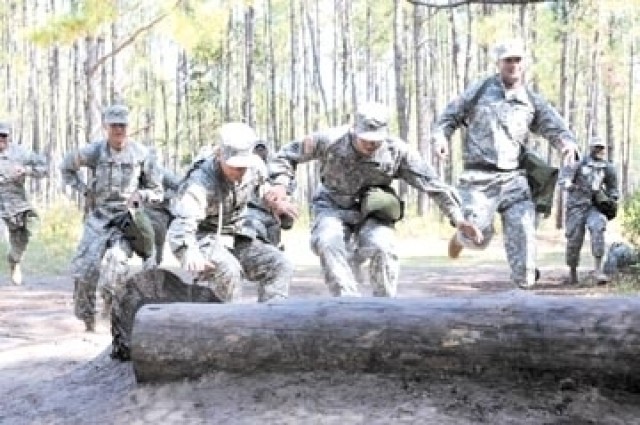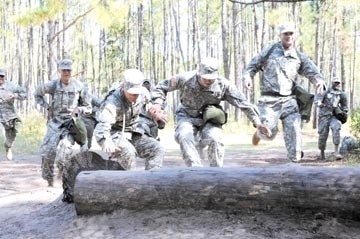FORT STEWART, Ga. -- Soldiers of 1st Brigade Combat Team recently went through training for the (Chemical, Biological, Radiological, Nuclear, Explosive) Consequence Management Response Force, or CCMRF, a mission they will be taking up in October.
"Everybody is coming out here motivated to learn everything we've been teaching them," said Sgt. Maria Cabrera, HHC 1-3 BTB, hand and arm signals instructor at the CCMRF lanes. "Some of them may not have known some of the things we're teaching out here, which is important. We cadre are out here all day, every day for this training, so we try to interact with all the Soldiers."
"A lot of people are getting knowledge out of it," said Sgt. John Sabatini, Alpha Co. 3rd BSB, a first-aid instructor on the CCMRF lanes. "These classes are on stuff we haven't learned in awhile because we've been on such a busy deployment schedule, and it's just basic stuff that we really need to get back to."
The training encompassed skills Soldiers may need during a CCMRF deployment such as first aid, Nuclear Biological Chemical equipment, reacting to a nuclear attack, communications and weapons training.
"This training is important because every Soldier needs to know their common tasks," said Staff Sgt. Elvis Facey, 3rd BSB, a combat medic and first-aid instructor on the CCMRF lanes. "When you're training to deploy, you're training to engage the enemy. This training is more geared toward engaging the civilian population, a citizen of the United States. It could be your aunt, cousin, niece or nephew that we have to help. So we have to gear down toward helping civilians over more hostile forces. A lot of Soldiers are adjusting because they just got back from a hostile environment, so this training is important."
First aid is the most important class a Soldier can take, said Facey. "If you look at what happened in Galveston, Texas, it's obvious that first aid is important. It could be anything, anywhere we could be called out to help with any number of natural disasters while on the CCMRF mission. If you're in a situation where someone is hurt it's good to be able to know how to put a dressing on the correct way."
Students going through the training noticed the emphasis on first aid as well. "First-aid training was high-speed," said Pvt. John Fitzjarrald a wheeled mechanic. "The instructors taught everything you might need to know in a CCMRF mission, like taking care of burns, CPR, treating shock and the like."
NBC training was also emphasized. "NBC training is important because if there's a chemical attack anywhere, this training going to save someone's life," said Spc. Matthew Wayas, Bravo Co. 5/7 CAV, an NBC assistant instructor. "If you mess it up even a little bit, it can be pretty bad. This training differs from warfare training because we're practicing as if we know we are going to be entering a contaminated area, instead of practicing for a nuclear attack."
But, there was also training for reacting to a nuclear attack. "A nuclear attack is possible in a CCMRF mission," said Sgt. Richard Randles, Co. G, 3rd BSB, nuclear attack instructor, "And if we are caught in that type of situation Soldiers need to know how to react to it."
"Soldiers in a CCMRF mission need to worry about civilians as well", said Randles. "Soldiers will need to help after a nuclear attack with medical assistance and transporting civilians out of the area.
"My class does more than prepare a Soldier for a nuclear attack," said Randles. "With the CCMRF training, we are more focused on nuclear and natural disasters, while with training for warfare we are more worried about other weapons. However, you can use the training from reacting to a nuclear attack in reacting to indirect fire and finding cover from direct fire."
The CCMRF mission differs greatly from a deployment in a hostile area, said Spc. Steven Cruz, a former Marine, and a Soldier in Delta Co. 5/7 CAV. "CCMRF is far more urbanized, so we are learning the basic necessities of what we will need to know out there."
"The instructors are more focused on being able to handle what might pop up, because you have to be ready for anything," said FitzJarrald. "You never know when a battle-buddy, or even a civilian that you might have found unconscious, needs help. It's important that if you're the first one there, you have to be able to help them. No matter what your rank, or what your job is you're going to have to help them, because there's not always going to be a medic by your side."


Social Sharing